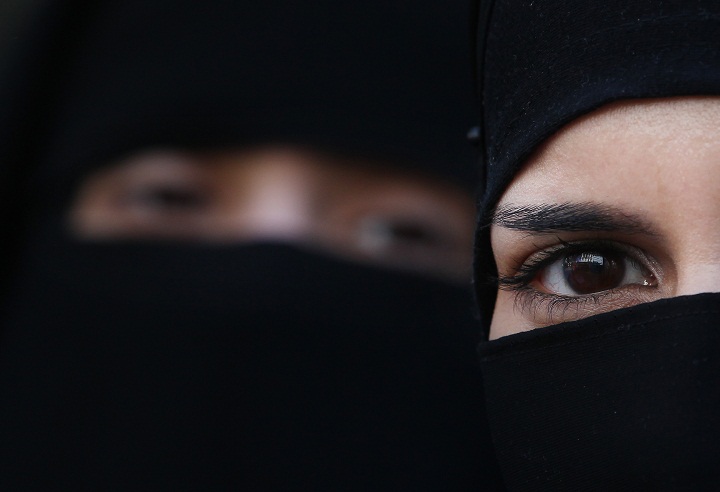Editor’s note: In an example used to illustrate the possible number of Quebec Muslim women who wear face coverings as a percentage of the Quebec population, the author stated that figure would be 0.007 per cent. In fact, the number is 0.7 per cent. This article has been corrected. We regret the error.

With a majority in the National Assembly, the Liberal Party of Quebec passed Bill 62, a law that claims to establish religious neutrality of the state.
The opposition parties, Parti Québécois and Coalition Avenir Québec, opposed the bill on the basis of it not going far enough while Québec Solidaire voted against the bill noting the absurdity of the law. The law itself goes into effect immediately, without a detailed framework or guideline on how the law will ultimately be enforced and applied.
While the text of Bill 62 does not explicitly refer to the burka or niqab, it is obvious that Muslim women who wear either will be disproportionately affected.
Quebec Justice Minister Stéphanie Vallée is certainly doing her best to avoid any claims of targeting religion as she has stated the ban on face coverings includes sunglasses as well. The bill was originally intended to apply to provincial public-sector services and provincially funded institutions but was amended in August to widen the scope to municipally funded services and public transit.
Of course, the state in Quebec and the rest of the country is already religiously neutral but this does not stop politicians in Quebec from discussing how to further neutralize religion on an annoyingly regular basis.
Well, some religions anyway.
The giant cross that adorns the wall of the National Assembly gets a pass on the basis of it being part of Quebec’s patrimoine, or cultural tradition, even though the cross was only introduced into the National Assembly in the late 1930s by then-premier Maurice Duplessis, a religious social conservative.
WATCH BELOW: Coverage of Quebec’s religious neutrality law
This type of selective secularism, wherein minority religions are specifically targeted, is the kind of thing that would make any other province cringe, yet it finds its way regularly into the political debate du jour in Quebec.
There are indeed legitimate reasons for this. Quebec has a checkered past as it pertains to the state and religion, which brought about the Quiet Revolution once Duplessis’ reign of religious social conservatism was over. Quebec also fancies itself an intercultural society, as opposed to a multicultural one, and culturally considers itself much more on par with France’s concept of secularism or laïcité.
LISTEN: Supriya Dwivedi and Matt Gurney on Quebec’s Bill 62
However, Quebec never seems to note that France is expressly secular in its constitution and places a prime importance on the concept, as clearly stated in Article 1, while Quebec as part of Canada is not expressly secular and is subject to the Charter, as well as legal precedent upholding the fundamental right of religious freedom.
Bill 62 is certain to meet a legal challenge, but that does not deter its supporters from making the false assertion that it furthers religious neutrality of the state.
State neutrality simply means that the state has no preference for one set of religious practices, thoughts, or beliefs over any other set and that all people should be treated equally. There is ample jurisprudence emanating from the Supreme Court of Canada to back this notion.
Champions of the bill, as well as those who are simply overly sensitive to any criticism levelled at Quebec, will note that wearing the niqab or burka is not a requirement in Islam and is merely practiced by those who have a more orthodox interpretation of the religion. That’s all well and good for making small talk at the next La Meute meeting, but it carries no legal weight. Again, the Supreme Court is clear on the matter that the religious belief must be sincere and not whether the religious belief is grounded in any objective religious obligation.
LISTEN: Supriya Dwivedi joins the Tasha Kheiriddin Show on AM640
During the last Quebec election campaign, as the rest of Canada was aghast at the incumbent Parti Québécois’ proposal of banning “ostentatious” religious symbols, it sort of flew under the radar in the rest of the country that while the Liberals criticized the PQ plan, they were advocating for their own watered down version of it.
In fact, back in 2010, the Charest Liberal government tried to implement a ban on the niqab after a woman was twice expelled from taking government-sponsored French courses. The legislation ultimately never passed, but the sentiment never died.
- Life in the forest: How Stanley Park’s longest resident survived a changing landscape
- ‘Love at first sight’: Snow leopard at Toronto Zoo pregnant for 1st time
- Carbon rebate labelling in bank deposits fuelling confusion, minister says
- Buzz kill? Gen Z less interested in coffee than older Canadians, survey shows
The most puzzling aspect of Quebec’s inability to let go of the niqab matter is that it really isn’t even a public policy issue. Most experts on the matter will peg the number of women wearing niqabs in Quebec at around 100, with the vast majority being concentrated in and around Montreal. But as I’ve noted before, there are no reliable metrics on how many women in Quebec wear face coverings for religious purposes.
According to Statistics Canada data, there are roughly 114,000 Muslim women in Quebec; veiled women represent a tiny fraction of that. Even if one were to assume that veiled women represent half of all Muslim women in Quebec, which would be an incredible overestimation, we’re still only talking about 0.7 per cent of the province’s population.
Legal challenges of this kind take a long time to work their way through the system, and while that happens Muslim women in Quebec are almost certain to see increased hostility – ranging from verbal abuse to physical attacks – as they did during the debate surrounding the PQ’s proposed Charter of Values.
Quebec is distinct from the rest of Canada for many reasons. Pandering to anti-Muslim sentiment shouldn’t be one of them. And yet here we are, once again.
Supriya Dwivedi is host of The Morning Show on Toronto’s Talk Radio AM640 and a columnist for Global News.











Comments